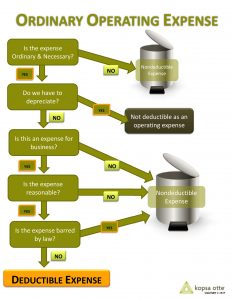The most overlooked or misunderstood tax issues you need to know about now.
If you haven’t been paying quarterly estimated taxes, you could end up owing a lot of money come April 15th. Deductions can help but not as much as you think. To get the lowdown on why every suite renter should pay quarterly estimated taxes and how key deductions work, we went straight to Larry Kopsa, CPA and a partner with Kopsa Otte CPA’s + Advisors, which specializes in the salon/spa industry and renters.
Explains Kopsa, “When you are in business for yourself, you are required to pay quarterly estimated taxes. It is really sad when I see new renters who made $25,000 and I have to tell them that they owe Federal Tax of $1,500, Medicare and Social Security Tax of $3,500 and State Tax of $500, for a total of $5,500.”
Why so much? Because the self-employed pay all those matching “entitlements” a former employer paid. And that’s not all—you owe the first quarter of the current year at the same time ($1,375 on the above amount). Also, don’t forget, most states require you to pay sales tax on retail sales. For these filing requirements, check with your local Department of Revenue.
Tax Deduction Dos and Don’ts
Suite renters should always keep a check-list of allowed deductions and save all documentation. These include but are not limited to: the rent for your suite, all supplies from hair color to gloves, business insurance and professional membership fees, promotion and advertising, educational classes and business travel, business software, professional magazines, legal fees and tax preparation. Suites usually include utilities and internet in the rent. Also, you can make tax-deductible contributions to a self-employed retirement plan.
According to Kopsa, the deductions renters are most likely to miss are meals, mileage and incidental expenses. “The tax code says that to be deductible, a business expense must be both ordinary and necessary,” he stresses. “An ordinary expense is one that is common and accepted in your trade or business. A necessary expense is one that is helpful and appropriate for your trade or business. There are some expenses that are barred by law or court interpretation, such as non-uniform clothing and putting a sign on your car and calling your car advertising.”
Which bring up the question, what are the most misunderstood deductions?
You use your phone for business, so it’s deductible, right? Few have landlines anymore but if you do in your suite, it’s deductible. But when it comes to cell phones, the internet and tablets, things get complex.
Says Kopsa, “Electronics have become vital to business, which makes cell phone and internet use a legitimate, deductible business expense. But cell phones and the internet are also used in our personal lives, so it’s a deduction that the IRS scrutinizes very carefully to make sure that personal usage isn’t being claimed as a business expense.
“Technically, you can claim the business use of your phone or internet as a tax deduction. So if 10-percent of your time on the phone is spent on business, you could legitimately deduct 10-percent of your phone bill. It’s the same for internet use. Fortunately, I have not seen any IRS auditor look too closely at this.
“Your cell phone number is likely listed within your advertising, including on your business cards. Since most are making appointments using this cell phone, it would seem logical that the primary purpose of this phone is for business. Similarly, with your internet-based website, you’re possibly taking appointments online, ordering goods and providing or storing other business-related information in the cloud, so you can mount a good argument that a large majority of the internet cost is deductible.”
Of course, you don’t want to find yourself “mounting an argument” because that means you’ve been audited.
Another common confusion involves your car. No, it’s not deductible, nor is driving back and forth to work. It really comes down to the primary purpose of a trip that is not just driving to work, and to tracking mileage.
“For example,” explains Kopsa, “say you go to the bank to make a deposit and also happen to stop at the grocery store on the way home. Since the primary purpose was business ,the mileage would be a write off.
“You generally can choose from two ways of deducting: either claim the standard mileage rate or report the actual expenses incurred while carrying out business-related activities. For renters, the mileage rate is the easiest method. The mileage rate for 2017 is 53.5-cents per mile; it’s 54-cents for 2016.”
Keep in mind, you must keep good records to “audit proof” the deduction. Maintain a log with the date of each tax-deductible trip you make, showing how many miles you drove and for what purpose. Also track the total number of miles you drove for the year by writing down the odometer reading the first of each year. Without a mileage log, an auditor can deny the deduction.
The third biggest challenge is health insurance, and for 2016, for the self-employed, it is deductible for both you and your family, if you are the one who pays it. Because it is difficult to guess what will happen in the future, always use a CPA. And because tracking all this can be difficult, Kopsa recommends using QuickBooks.
“It’s easy to use and inexpensive,” he notes. “Clients using accounting software make it easy for us tax preparers to find deductions that they may be missing because all receipts and disbursements are recorded, and the books are balanced. In addition, the IRS likes it when a taxpayer has a balanced set of books. I like to say, ‘What you can measure, you can manage.’ Good production software (which tracks clients appointments, money received and inventory) and accounting software like QuickBooks give you the information you need to set goals and be profitable.”
Finally, says Kopsa, there are three items every taxpayer needs: documentation, documentation and documentation. To be better prepared for next year, sign up for the Kopsa Otte E-Newsletter at Salon and Spa Blog.
Note: The information provided does not constitute legal, tax, accounting, or financial advice and is offered as an information service only. Those seeking specific advice should contact a professional advisor. No liability whatsoever is assumed in connection with the use of this information.







